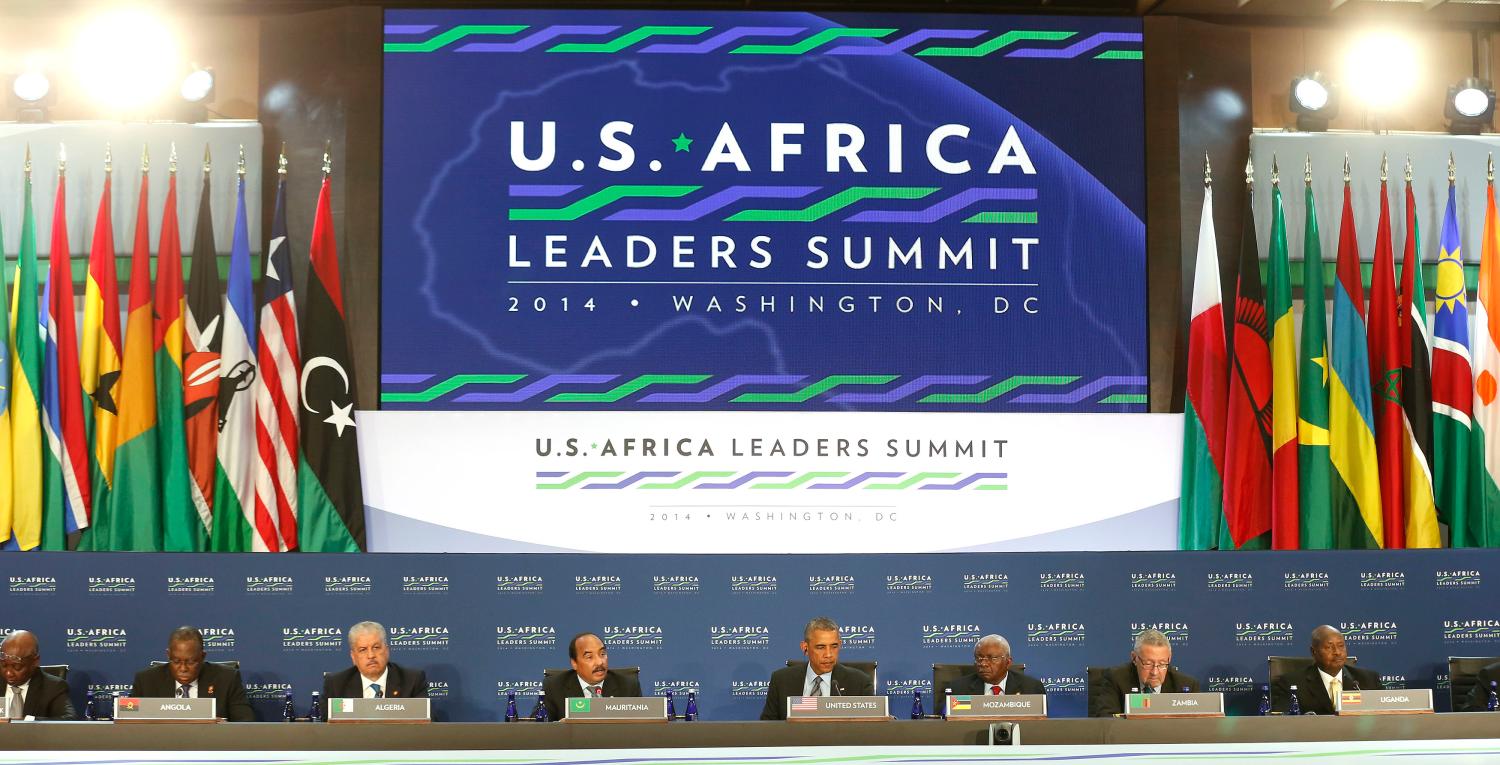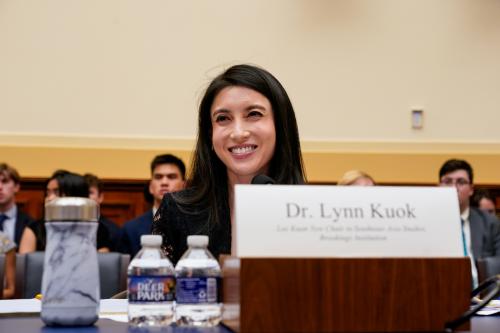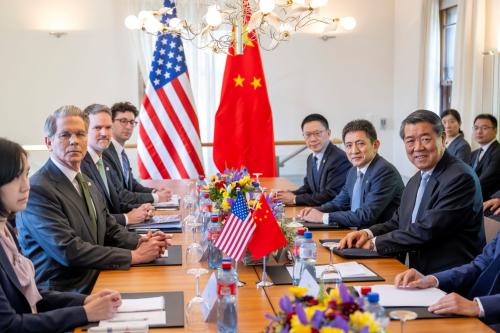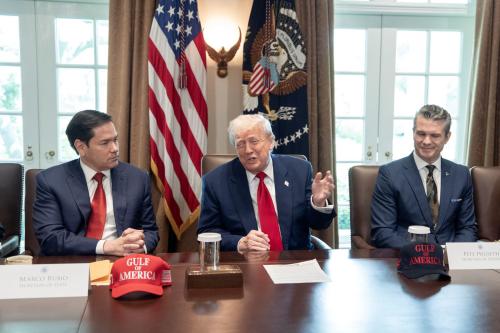Editor’s Note: The U.S.-Africa Leaders Summit blog series is a collection of posts discussing efforts to strengthen ties between the United States and Africa ahead of the first continent-wide summit. On August 4, Brookings hosted “The Game Has Changed: The New Landscape for Innovation and Business in Africa,” at which these themes and more were explored by prominent experts. Watch video and listen to audio from the event »
Although the Obama administration’s new security initiatives did not make much news during the U.S.-Africa Leaders Summit, such efforts are vital to Africa’s future. Enhancing these initiatives as part of a broader security agenda will strengthen U.S. ties with the continent and lay a foundation for peace and prosperity.
With $33 billion of public and private commitments aimed at enhancing commercial ties with the continent, it appears last week’s U.S.-Africa Leaders Summit successfully helped focus U.S. policymakers and business leaders on Africa’s growing relevance in the global economy. Although less touted during the summit, a critically complementary element is ensuring the requisite peace and security upon which commerce depends. Last week, the administration took some important steps toward a renewed security agenda in Africa and should go even further to support and cement the continent’s emerging prosperity.
The lower incidence of civil violence across the continent in recent years has helped set the conditions for Africa’s impressive economic expansion. But unrest in hot spots—both in newer conflicts such as Libya, Mali, the Central African Republic, South Sudan and Nigeria, and in perennially unstable places like the eastern Democratic Republic of the Congo (DRC) and Somalia—threatens to derail Africa’s celebrated gains in peace, democratization, economic growth and poverty reduction over the past decade. And while lower profile during the summit, the security-related initiatives announced by the administration are just as significant to Africa’s future and its relationship with the U.S. as those related to business and civil society.
New Security Initiatives: A-Prep and SGI
At the end of last week’s summit, the Obama administration announced two new initiatives related to peace and security: First, the African Peacekeeping Rapid Response Partnership, dubbed “A-Prep,” will address shortfalls in Africa-based peacekeeping forces. In recent years, new peacekeeping missions on the continent have exposed the dearth of ready, capable African forces. A-Prep focuses U.S. military training and assistance on six countries —Senegal, Ghana, Ethiopia, Rwanda, Tanzania, and Uganda—in order to expand the number of African militaries capable of rapid peacekeeping response, in partnership with United Nations (U.N.) and African Union missions. Critically, the Obama administration has made a multi-year commitment to A-Prep, hoping to entice other international funders to participate and expand to other African countries in the future. But with only $110 million annually spread over six countries, low funding levels will likely constrain the effectiveness of the program.
The second effort, the Security Governance Initiative (SGI), will work to build capacity in militaries and civilian security institutions to fight extremism on their own turf, also relying on six pilot nations: Ghana, Kenya, Mali, Niger, Nigeria and Tunisia. SGI could have some pitfalls. Housed at the State Department with four other agencies in support, it rightfully incorporates a holistic, interagency approach. But experience with similar U.S. government efforts in Africa (such as the Trans-Sahel Counter Terrorism Program) teaches us that interagency priorities and politics can overwhelm the stated needs of partners on the ground. For the program to be effective, the National Security Council will need to play a strong lead role, and the SGI team at the State Department must have the political and budgetary authority to undertake objective analysis, listen to partner countries, and allocate resources and technical assistance from various U.S. government agencies accordingly.
Despite such typical bureaucratic challenges, SGI’s promising components could have lasting effect on African security. The focus on security sector institutions addresses a dangerous gap in many countries’ ability to administer, grow and sustain professional security services. Most intriguing, the documents released by the White House suggest that that the program will match U.S. investments with partner countries’ own resource commitments, an approach that could significantly incentivize investment from partners and help the program survive into maturity. While there are details to be ironed out relative to the levels partners will match, combining host nation commitment with U.S. capital increases the chances that the program will ultimately succeed.
Unfortunately, the funding levels announced for both A-Prep and SGI are likely too small to generate enough momentum for lasting impacts. The Obama administration states that in future years, “funding will be commensurate with maturing program needs and expansion to additional countries,” but only $65 million has been allocated for the first year of SGI, which averages out to just over $10 million per country. To put that figure in context, U.S. support for the U.N. peacekeeping force in the DRC amounts to $400 million annually. If A-Prep and SGI show promise, the administration and Congress should consider significantly increasing the budget of both programs.
A Renewed Security Agenda
Taken together, the announced security initiatives at the summit were an important step toward a more clear, effective and collaborative approach to security on the continent. But there is still more to do.
While the president’s U.S. Strategy Toward Sub-Saharan Africa in 2012 laid out strong principles of the administration’s approach to the region, African leaders want to understand how specific American efforts match up with the strategy and their particular challenges—al-Shabab in Somalia and militants in Libya still roil their home regions. In West Africa, al-Qaida in the Islamic Maghreb (AQIM) and Boko Haram have brandished increasingly sophisticated capabilities, particularly in terms of kidnappings for ransom. Lasting disputes over sovereignty in the DRC, Sudan and South Sudan pose fundamental security dilemmas for their neighbors and for the African Union to address. While the U.S. cannot tackle all security problems across the continent, a detailed approach that applies the 2012 strategy’s peace and security principles to these real-time threats will propel a renewed U.S.-Africa security agenda forward, cementing key partnerships, leveraging limited American resources cost-effectively, and laying the foundation for peace and prosperity on the continent.
To implement such an agenda, the U.S. and its African security partners must move beyond hollow discussions of the “militarization” of U.S.-Africa policy, a criticism most associated with the U.S. Africa Command (AFRICOM). Some African pundits are understandably wary of both external powers and stronger local forces exercising undue influence on African politics, while other U.S.-based analysts are also critical of a policy that serves military interests more than African citizens.
But security threats must be dealt with head on for economies and societies to thrive, and weak, disorganized and unprofessional security forces are unable to meet current challenges. As National Security Advisor Susan Rice clearly stated in advance of the summit, the U.S. is “not looking to militarize Africa.” Rather, as President Obama explained in his May speech at West Point, the U.S. is interested in building the capacity of local partners to prevent and resolve conflicts; and in Africa, for example, ministries of defense value the enhanced capacity AFRICOM provides to peacekeeping and counter-terrorism missions.
As last week’s summit highlighted, Africa’s economic rise is becoming more conspicuous in the U.S. and around the world. But without strategic investments in the security sector by Africans and the international community, instability can destroy communities, destabilize nascent institutions, retard growth and discourage potential investors. And given the growing multitude of stakeholders on the continent and the complexity of former colonial relationships, the U.S. remains a trusted broker in Africa. In fact, many African leaders explicitly requested peace and security issues to be included on the summit agenda. With the right approach and increases in resources, the Obama administration’s proposed initiatives can provide the requisite momentum for a renewed agenda to enhance security cooperation and reinforce both American and African goals for peace and mutual prosperity.
Note: Dane Erickson is a Lecturer at the University of Colorado Denver and previously a foreign policy advisor on Africa to the Barack Obama 2008 Presidential Campaign. Alice Friend is pursuing a PhD at American University and was Principal Director for African Affairs at the Pentagon from 2012 to 2014. This blog reflects the views of the authors only and does not reflect the views of the Africa Growth Initiative.
The Brookings Institution is committed to quality, independence, and impact.
We are supported by a diverse array of funders. In line with our values and policies, each Brookings publication represents the sole views of its author(s).





Commentary
The U.S.-Africa Leaders Summit: Security Initiatives Are Critical to Cementing Africa’s Gains
August 14, 2014